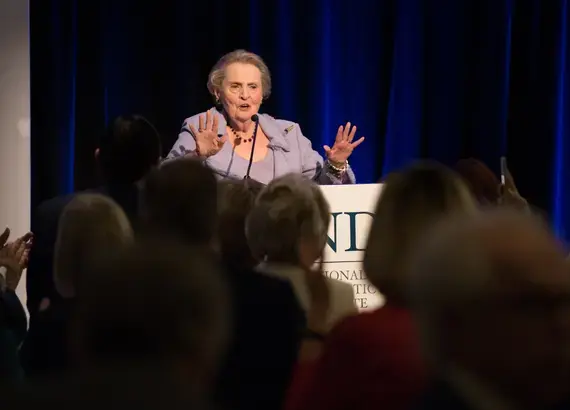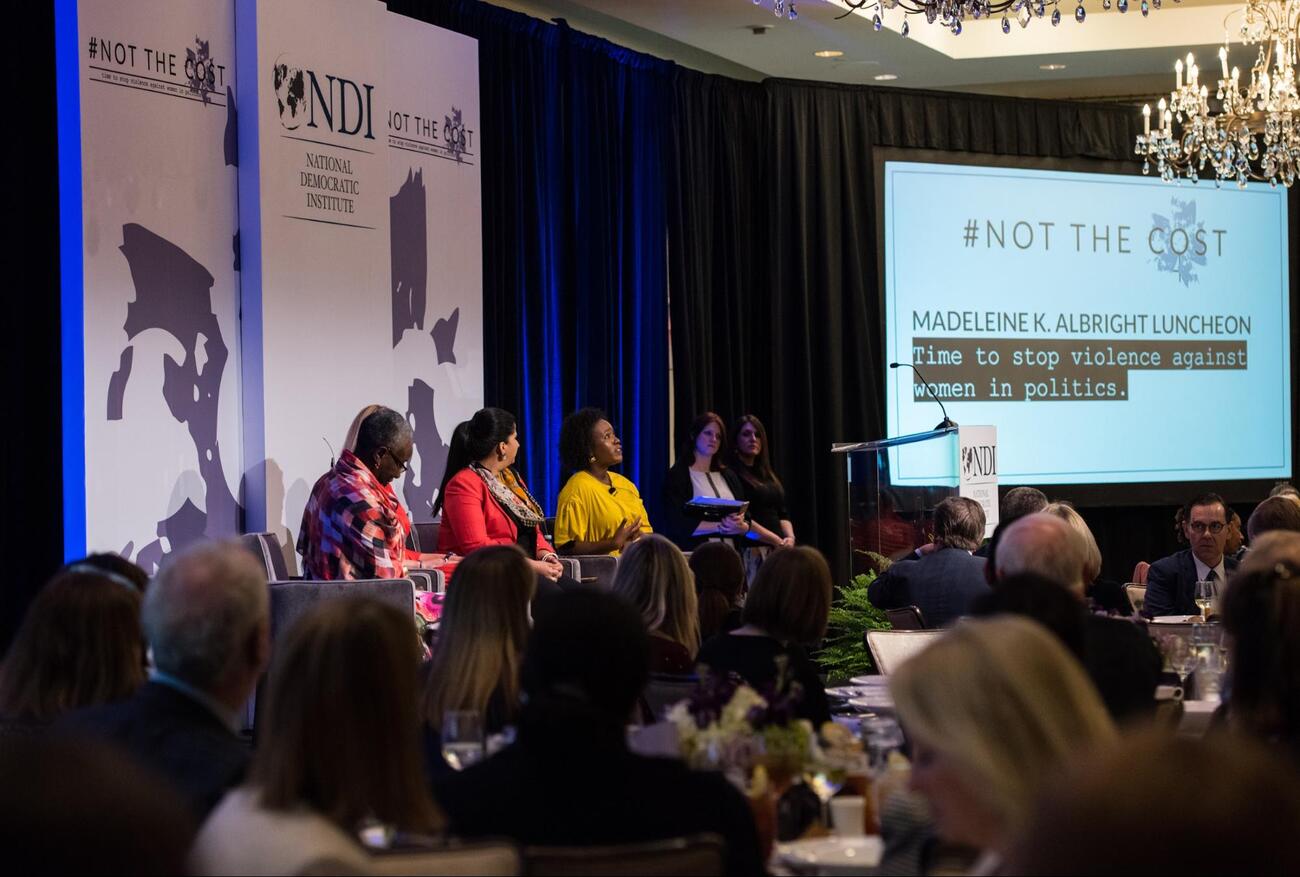
Madeleine K. Albright, former Secretary of State and NDI Chairman, urges guests to take action to end attacks on politically active women. Photo by Margot Schulman
Success Story
Madeleine K. Albright Makes Stirring Call To Action at NDI’s Annual Luncheon: Violence is #NotTheCost for Women in Politics
Former Secretary of State and current National Democratic Institute Chairman Madeleine K. Albright delivered a powerful keynote address at her namesake luncheon on Wednesday, calling on the more than 300 political leaders, activists and advocates in attendance to help end violence against women in politics.
“Whether you wear a ceremonial dress or a pantsuit. A hijab or a sari. Whether you are standing on a dirt floor or bumping up against a glass ceiling," Albright said. "Make our voices heard in a hundred different languages, wherever questions of freedom and dignity and human rights are at issue.”
Held annually in Washington, D.C., NDI’s Albright Luncheon celebrates the role of women in politics and the work of women’s political empowerment. This year’s event focused on the Institute’s #NotTheCost campaign, which aims to raise awareness, collect information and build capacity among its partners on the issue of violence against women in politics. The #NotTheCost campaign was launched in 2016 and championed by Albright, who made the direct ask for the United Nations to start including the issue of violence against politically active women in its annual thematic reports. As a result of Albright’s call for action and the campaign’s success, the United Nations Special Rapporteur on Violence Against Women, Dr. Dubravka Šimonović, will present a report on the issue at October’s UN General Assembly meeting – the first of its kind.
Prior to the Luncheon, NDI hosted its #NotTheCost Forum, which brought together nearly two dozen women to discuss topics such as the role of political institutions in stemming violence against politically active women and the use of social media platforms to build a more open, inclusive and democratic internet. Forum guests included former U.S. Ambassador to Hungary Colleen Bell, Irish Senator Catherine Noone, U.S. Congresswoman Gwen Moore, and others who shared their experiences of working in the political arena while being targeted for harassment, abuse and assault. The panels were led by an all-star cast of moderators, including NDI Board Member Donna Brazile. Between panel discussions were gripping personal testimonials; in one, Togolese social activist and author Farida Bemba Nabourema – known for her online articles denouncing corruption – spoke movingly about her struggle to understand, reject and ultimately fight back against the flood of harassment.
“I learned to tolerate the abuse,” Nabourema said. “But the moment I learned it was an impediment to other women entering politics, I knew I had to do something.”
All over the world, women put their security and lives in danger when they enter politics and public service. In her address, Secretary Albright named some of the women who were killed within just the past two years because of their political engagement. Those named included Brazilian city councilor Marielle Franco and British Parliamentarian Jo Cox, whose murders made global headlines. Unfortunately, for each horrific story that makes the news there are many more that don’t, and Albright noted that political violence doesn’t need to be deadly – or even physical – to be harmful.
“These and other prominent crimes have attracted much attention,” she said. “But the majority of violence towards women in politics takes place far from the public eye, behind closed doors, in the form of assaults and threats, and vicious comments – whether direct or through social media.”
A recent NDI survey of women politicians in four countries found that 55 percent have personally experienced physical, sexual, or psychological violence – such as harassment, threats or coercion – while carrying out political party functions. The Luncheon featured a discussion with three women who have each faced violence during their political careers, moderated by Sandra Pepera, NDI’s director for gender, women and democracy.

“The video of the speech that went viral was even put on a neo-Nazi website,” Akiwowo said. “The leaders of that website were recruiting trolls to troll me, all the time and across multiple platforms.”
“It was relentless, for weeks on end,” she said of the abuse.
Rather than back down, Akiwowo founded Glitch!UK, an organization named after what she describes “a glitch in the system” that allows technology platforms like Facebook and Twitter – which can be employed for positive means, such as better constituent engagement – to be weaponized as tools of intimidation and hate.
“We need to hold social media companies accountable for what’s happening on their platform. Decision-makers need to beef up their legal framework so that when women report it, it is taken seriously. And finally, we need to raise the next generation of young people to say, ‘look, this is not how you behave online; understand that your words have power.’”
The panel also featured Fátima Mena Baide, a Honduran city councilor in San Pedro Sula, and Mimoza Kusari-Lila, a member of parliament from Kosovo, who previously served as the first and only woman mayor of Gjakova. Both women described toxic political environments rife with discrimination, harassment, and gender-based violence.
In addition to the keynote address from Secretary Albright and the panel discussion, actress and human rights advocate Nazanin Boniadi – known for her roles on Homeland and Counterpart – spoke about the crucial link between women and democracy.
“We must recognize that the status of women and girls and the stability of nations go hand-in-hand,” she said. “Countries with the most discriminatory laws and cultural attitudes toward women tend to also experience the greatest unrest and turmoil, which in turn directly impacts global stability.”
That was a sentiment that was echoed throughout the Luncheon. Each speaker highlighted the critical roles women play in healthy democracies – among them, injecting new perspectives into political debates, raising issues that others overlook, and listening to voices that are often ignored. Violence against women in politics – regardless of its form – is always meant to intimidate women, to silence their voices and to prevent them from participating freely and fully in public life. The #NotTheCost campaign helps to amplify the voices of women all over the world who believe that enough is enough, and that violence against women in politics must end – and must end now.
As Secretary Albright said in her speech, this is not a request.
“As women, we are not asking for our rights,” she said. “We were born with our rights. We do not need anyone’s permission to practice them. If you attack one of us, you attack all of us; but if you stand with us, we can – and we will – make the world freer, more peaceful, and more just than it has ever been.”
